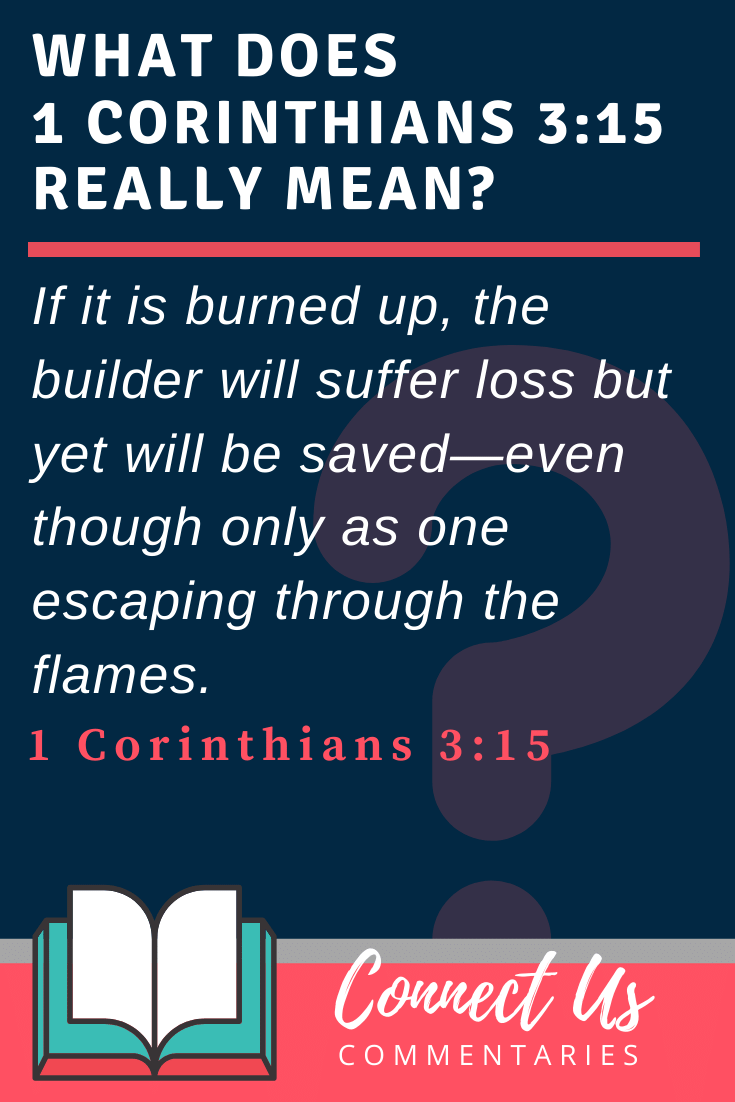1 Corinthians 3:15
“If it is burned up, the builder will suffer loss but yet will be saved—even though only as one escaping through the flames.”
Explanation and Commentary on 1 Corinthians 3:15
This verse means that if you are generally an honest Christian but have weaknesses, you will suffer loss but will still be saved yourself.
Paul is talking to the Christian teachers and ministers in the city of Corinth and imploring upon them to build on the foundation Paul had initiated, with Jesus as the cornerstone (Ephesians 2:20). Paul uses gold, silver, precious stones, wood, hay and stubble as examples of building materials. Teachers who build their converts or their congregations with gold, silver and precious stones will see their work (their congregations) preserved when judged by God, but those that build with wood, hay or stubble will see their work destroyed in the fire.
On that day of judgment, everyone will be able to see which of the teachers have been preaching pure Christian doctrine, as the teachers will be judged by what “sort” of work they produce (1 Corinthians 3:13). Those that build on wood, hay, and stubble mean teachers who depart from scripture by teaching inadequate or superficial interpretations of His word through less than perfect motivations or understanding. These people minister with inadequate materials, and though God will save the teachers personally, their congregations will not have a strong enough foundation to survive the hardships of the Christian life.
Instead, those that build on gold, silver and precious stones (not meaning jewels but materials like marble and granite) are those who receive and spread the scripture in its pure form, unadulterated. The congregations of these teachers will maintain their spiritual integrity through the trials of Christian life.
The Calvinists, who are a branch of Protestantism who broke from the Roman Catholic Church in the 16th century and were led by John Calvin, taught that this verse supports the view that a Christian’s salvation is eternally secure, no matter what he or she does or believes in his life. The Calvinist view seems to conflict with Paul’s reference to the converts of altered scriptural teachings who would be “burned up” in the fire.
Breaking Down the Key Parts of 1 Corinthians 3:15
#1 “If it is burned up…”
We will be tested before God on the day of judgment. If our foundation is wood, hay or stubble, and not gold, silver or precious stones, then it will not be strong enough to carry us through the hardships of all Christian life and we will abandon our faith. As for the teachers to whom Paul originally spoke, their congregations will not survive the trials of Christian life and will surrender their faith (Hebrews 3:12).
#2 “…the builder will suffer loss but yet will be saved…”
God will still save these teachers if they personally past His test, but their lives will have been wasted because their congregation will be lost, and they will receive no crown to give to Jesus for His glory (Revelation 4:10-11).
#3 “…even though only as one escaping through the flames.”
These teachers will barely receive salvation (1 Peter 4:17; 1 Peter 4:18) (Zechariah 13:9) and only escape the flames of damnation with their own lives.
Expert Overview of 1 Corinthians
Biblical Translations of 1 Corinthians 3:15
NIV
If it is burned up, the builder will suffer loss but yet will be saved—even though only as one escaping through the flames.
NLT
But if the work is burned up, the builder will suffer great loss. The builder will be saved, but like someone barely escaping through a wall of flames.
ESV
If anyone’s work is burned up, he will suffer loss, though he himself will be saved, but only as through fire.
KJV
If any man’s work shall be burned, he shall suffer loss: but he himself shall be saved; yet so as by fire.
NKJV
If anyone’s work is burned, he will suffer loss; but he himself will be saved, yet so as through fire.

Natalie Regoli is a child of God, devoted wife, and mother of two boys. She has a Master's Degree in Law from The University of Texas. Natalie has been published in several national journals and has been practicing law for 18 years.